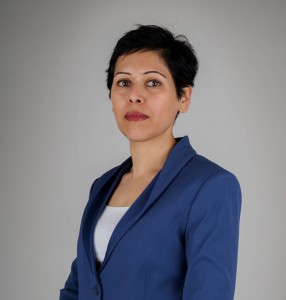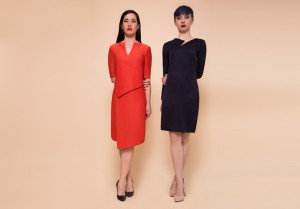interview with heidy rehman, founder of rose & willard
Heidy Rehman is the founder of Rose & Willard, a fashion label that’s all about empowering women in the workforce. Rehman comes from an Analytics background and set about in the fashion world when she was at a crossroads in her life, and has produced a brand that is both fashion-forward, ethically conscious, but also smart and wearable. I had the chance to chat to Heidy about how she started her business and about what inspired her to do so.
Can you tell us a bit about yourself – how and when did you get started in the fashion industry?
I was brought up in a small working town near Newcastle. I moved to London when I was sixteen, studied and graduated with a Maths degree from Queen Mary, London. I subsequently studied accountancy. Prior to setting up this business I worked as a stockbroker at Citi for almost 14 years. The last four years or so were spent in Dubai where I was top ranked for emerging market analysis of the chemicals and construction sectors. I set this business up in late 2013 and we launched at the end of September 2014. As I explain in the next answer I’d always wanted to do something for myself. I was at a crossroads in my life and so took the leap. Having a business background certainly helped. The creative side was accomplished by hiring people with that expertise.
Who/What inspires you?
I’d always known that I wanted to do something for myself. It just took a while to decide what exactly that was going to be. Looking back the decision to set up a womenswear brand seemed inevitable given my frustration at not being able to find the clothes I wanted and needed to wear in my professional life. I also found that colleagues shared that frustration. I’d also been looking for an opportunity where I could demonstrate the values I hold and give something back. This situation coincided with my having reached as far in my career as my current job would allow. I was at a crossroads and change was beckoning. It was a scary and tough decision but one I do not regret. The journey so far has been challenging but fun.
Tell me about how Rose & Willard got started?
It started with lots of research (I was a research analyst). I analysed the market and read a lot of books. While I was still living in Dubai I also started laying the foundation in terms of registering the company, getting a logo and starting the trade mark process. On returning to London I interviewed for the creative staff I needed, found and equipped a studio and got the ball rolling. Luckily I’m a saver and didn’t have the headache of having to source finance.
What is the purpose, inspiration and/or motivation behind Rose & Willard?
Our mission is to create beautiful pieces that are sculpted to complement and celebrate a woman’s form so as to invoke a confidence we hope will percolate throughout her day. This runs in tandem with codes of conduct to which we are committed. We believe in ethics and empowerment, we like to fly the British flag and we like a bit of humour. We use luxury fabrics – the same as those used by high end names such as Victoria Beckham, Stella McCartney, Burberry, Paul Smith, etc. Our craftsmanship is also of an exceptional standard with almost all of our production undertaken in London. Our new collections are all being produced in-house. BUT we don’t charge luxury prices. From an ethical standpoint we investigate every fabric, trim, label supplier plus every manufacturer for proper working practices and especially employee working conditions. We measure this in terms of the types of conditions we ourselves would be willing to work under. This principle extends to and includes our own studio where every intern is paid. This is in sharp contrast to the fashion industry overall where interns work for no pay. Working conditions and providing opportunities for my staff are important to me. I can cite several examples where I’ve hired people with no real experience and where they have gone on to prove themselves and develop and build their CVs. Also none of my staff works longer than eight hours per day. I believe that the quality of our product and our ambition of Doing The Right Thing would resonate strongly with the achieving women we aim to reach out to. From an empowerment perspective – as well as the empowerment principles in place at our studio – our aim is to create beautifully-crafted, luxurious and modern pieces that flatter the female form. Each piece is carefully designed to enhance a woman’s most becoming aspects while simultaneously camouflaging those less loved areas.
What do you hope women who wear your brand feel and experience about the clothes?
The feedback we have had already is that they feel feel “incredible” when wearing our clothes. That is exactly how we want them to feel. Ultimately we want that feeling to engender a confidence and empower women to go out and conquer the world.
Tell me about the charity partners that you have teamed up with – how did they get involved and what is their role within the brand?
The charities we have teamed up with are: Rosa – supporting initiatives that benefit girls and women in the UK, Shine Trust – helping disadvantaged children and teenagers recognise their potential, EDT – which encourages young people, and especially girls, into maths and science (this one’s quite close to my heart given these were my subjects – I studied maths and was a chemicals analyst), Futures for Women – society for promoting the training of women, The Medaille Trust – Charity founded to help young men, women and children freed from trafficking and Inspiring the Future, of which ‘Inspiring Women’ is a part. This is a charity which connects employers with schools and colleges with a view to preparing the next generation for the world of work. I approached all these charities as what they do resonates strongly with our ethics. We are also looking to work with the Armed Forces charities out of respect for those willing to lay down their lives for us. So far we have worked with Futures for Women (where we donated a prize at a raffle at their annual event). We have worked with Medaille Trust (donations). We have also taken part in school volunteering initiatives with Inspiring the Future.
What are your thoughts on gender inequality in the workplace and how do you feel your brand is combating this?
I worked in the City for almost 14 years – an extremely male-dominated, public school boy environment. All of my managers were men. As a woman, I often found that I had to prove myself much more than my male contemporaries. I forget the number of times I was told ‘Next year’s your year.’ I expect that will change with more women joining and staying in the workforce, driven primarily by the increases already evident of women in tertiary education. How I approach management – The Economist has written articles on women’s management qualities. It argues that these qualities are valued in modern companies. It refers to the ‘leadership behaviours’ more commonly found in women and which include ‘people-development; setting expectations and rewards; providing role models; giving inspiration; and participative decision-making.’ The article also cites two other arguments – ‘Women are better at “androgynous” management—that is, combining supposedly “male” and “female” characteristics into a powerful mixture. Women differ from men not so much in their leadership styles as in the values that they bring to the job. They are much more influenced by compassion and fairness than men.’ These points are interesting and resonate with me. When I set up my company I decided that I would create a flat, open structure for everyone – no hierarchies. I did this because I wanted ideas to flow and I believe ideas get blocked by levels of management. I believed some people, especially women, would lack the assertiveness to suggest an idea over and above their line manager. If they didn’t have a line manager, then that would open the way hopefully. I regularly say to all the team ‘Always feel free to bring me ideas – a good idea is a good idea regardless of who suggests it.’ I’ve been very keen on developing all my staff. Indeed I deliberately took the approach of hiring people no recruitment consultant would ever have suggested. Most of my staff had little or no real, applicable work experience when they joined me. I took this approach because I didn’t want ‘square pegs for square holes’. Rather I wanted able, hungry people who were willing and ready to demonstrate their capability. I also made incentives clear and real. Even at interview I would make it clear to candidates that the right person could progress. And I have stuck to that. There is no one at this company who doesn’t have a much stronger CV now than when they joined. Importantly they know I don’t make empty promises or dangle carrots indefinitely. My view is that women often lack the assertiveness that seems to come more naturally to men. My aim is to always maintain a structure of equality and to encourage everyone to express their views and concerns. Hopefully that will help drive a more assertive approach and propel everyone forward. I have also always looked to accommodate those of my staff with children. For example, one staff has asked to have all of August as a holiday as she has two children of school age. I am willing to accommodate this. I have also allowed flexibility in her hours so she can take her children to school. She is a valued team member and it would be wrong to risk losing her simply because she has family commitments. I believe as more women enter and stay in the workforce, they will develop a stronger lobbying voice which will compel corporates to create more flexible working for those with families.
What are your hopes/plans for the future of Rose & Willard and for your career in general?
Of course, I would like Rose & Willard to grow and prosper. And I would love to have a flagship store. That said, I’d want this business to reflect in ten years the values it has today. From a personal perspective I’d still want to be a part of this. If time permitted I’d also want to spend more time driving our ethical stance, especially in relation to changing working practices, especially for those who work in appalling conditions in developing countries making cheap fast fashion clothes. I believe change can and should happen.
Do you have any advice for women who have experienced gender inequality in the workplace or in the fashion industry?
Assertiveness is always the key. I find that women, and I did this myself, will demonstrate their dissatisfaction but not in the most assertive way. I would urge women to prepare themselves and take clear decisive steps. For example, write a list of your grievances in as objective a manner as possible, e.g. was there a lack of recognition for a job well done. Always look to quantify where possible. Then I would suggest that a list is written which sets out the solution to any grievance. Managers like solutions, they don’t like problems. So perhaps present the grievance and deliver the answer. If there are a number of issues then deal with each separately. And always treat each objectively. Never cry or show emotion. To any manager this gives the impression that you can’t cope. Also I would suggest having any conversation in a relatively formal setting, i.e. set aside a time and place to discuss the matter at hand. That lends gravity to the issue. Always avoid having off-the-cuff discussions where there is a grievance or issue you want to have addressed. Invariably the person will not be in the correct frame of mind to deal with the matter or may be time-pressured, etc.
Do you have anything else to add?
There is a rising rate of women in tertiary education. According to UNESCO this has grown at twice that for men since 1970. This has been echoed by ICEF monitor, a market intelligence agency. They claim that by 2025 there will be 1.4 women to every man in higher education institutions in the OECD. In some countries there will be twice as many women as men in these institutions. With women then accounting for higher numbers of graduates, inevitably, this will lead to higher participation rates of women in the workforce. As those numbers rise, along with women’s financial strength, so will their lobbying power in terms of dealing with governments and corporates and in respect of establishing better positions and prospects for themselves. This should result in a closure of the pay gap and better conditions for working mothers. The tide has already turned …




